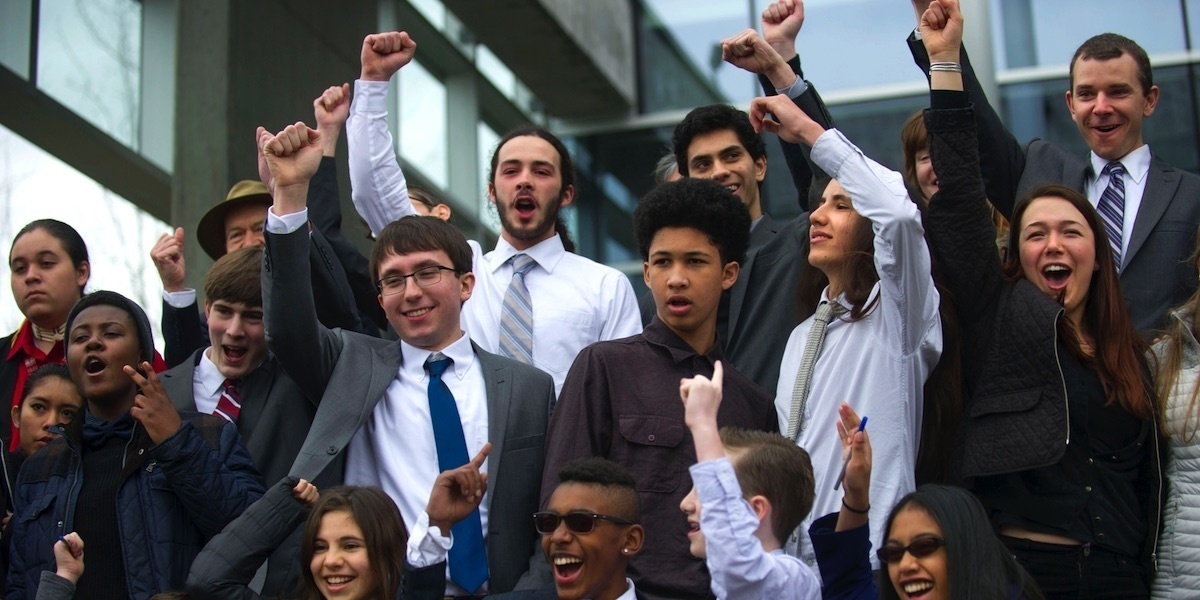By Lorraine Chow, EcoWatch. Reposted with permission from EcoWatch.
A federal court rejected the Trump administration’s attempt to shut down a landmark lawsuit initiated by 21 young plaintiffs suing the government for its creation of climate danger.
The three-judge panel with the Ninth Circuit Court of Appeals in San Francisco denied the White House’s writ of mandamus petition filed in June, a rarely used legal maneuver that would have dismissed Juliana v. United States.
In the unanimous decision Wednesday, Chief Judge Sidney R. Thomas called the petition a “drastic and extraordinary remedy reserved for really extraordinary causes” and the Trump administration’s motion did not satisfy that standard.
“The issues that the defendants raise on mandamus are better addressed through the ordinary course of litigation,” Thomas wrote, thus allowing the case to move forward.
Trump Administration Seeks ‘Drastic Remedy’ to Derail Kids Climate Lawsuit https://t.co/ll68Hn8xIn @zerocarbonworld @EUClimateAction
— EcoWatch (@EcoWatch) June 11, 2017
“The Ninth Circuit just gave us the green light for trial,” said Julia Olson, the chief legal counsel for Our Children’s Trust, the organization spearheading the lawsuit. “We will ask the district court for a trial date in 2018 where we will put the federal government’s dangerous energy system and climate policies on trial for infringing the constitutional rights of young people.”
Juliana v. United States was filed in 2015 on behalf of 21 young people who argue that their constitutional and public trust rights are being violated by the government’s failure to take significant action on global climate change.
The Center for Biological Diversity, one of many environmental organizations that filed an amicus brief in support of the suit, celebrated the news.
“This is a huge victory for young people fighting to protect their future from climate chaos,” Kassie Siegel, the director of the Center for Biological Diversity’s Climate Law Institute, said. “It should be the case that forces the government to reverse its stance on climate change and take the rapid, ambitious action we need.”
The young plaintiffs are looking forward to seeing the case go to trial.
“I’m grateful that my fellow plaintiffs and I can have our voices heard, and that climate science can have its day in court,” Victoria Barrett, an 18-year-old plaintiff from White Plains, New York, said. “The Trump administration tried to avoid trial, but they can’t ignore us. Our future is our choice and I believe the courts will stand with our constitutional rights.”
Kiran Oommen, a 21-year-old plaintiff from Seattle, Washington, added: “The question of the last few years has not been ‘do we have a case’ but rather ‘how far will the federal government go to prevent justice.’ We have seen that they are willing to go to many lengths to cover up their crimes and maintain the status quo, but not even the Trump administration can go far enough to escape the inevitable tide of social progress. The Ninth Circuit’s decision affirms that we are on the side of justice, and for justice we are moving forward. We’ll see you in court.”
Main image: Young plaintiffs cheer outside a federal courthouse in Eugene, Oregon. Credit: Robin Loznak, Our Children’s Trust, via EcoWatch
Subscribe to our newsletter
Stay up to date with DeSmog news and alerts






